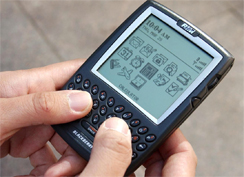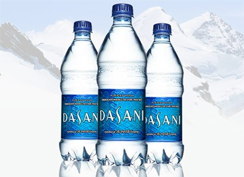The art of creating brand names
It's an age-old question: "What's in a name?" As Lee Cowan tells us now, if you're in the business of launching a brand-new product, the answer is ... everything:
"There's no question this is getting much more difficult than it was," said David Placek.
He's known as a "namer." His Sausalito-based company, Lexicon, has named some of the biggest products around. "It's not really about a lot of names, it really is about solving problems."
It came up with "Outback" for Subaru, "On*Star" for General Motors, "Pentium" for Intel, and the bottled water Dasani for Coca-Cola.
"When you think about it, nothing is used more often, or for a longer period of time, than either their company name or their brand name," Placek said.
"It sticks, for better or for worse," Cowan said.
"It does. It's also the one thing your competitor can't take away from you in the end."
He charges as much as $100,000 to name a new product -- and it's not as easy as Don Draper makes it look in "Mad Men," where he dubbed the slide projector wheel "the Carousel."
"I've never seen that moment in 30 years of doing this," Placek said. "It doesn't happen like that."
It used to be that successful product names were often family names, like Singer sewing machines, or Hoover vacuum cleaners.
"As companies got bigger and marketing came into the picture, people began making the decision that I've got to be bigger than my own name," said Placek.
Ford can still bank on its family name -- despite its poorly-named Edsel. But newer automakers, like Elan Musk, had to break through with something different.
"Let's take Tesla, which I think is a wonderful name," said Placek. "If Elan Musk had decided to call that 'The Musk,' provocative, but kind of slow-moving and it doesn't have the aspiration quality of a Tesla."
Tesla, for the record, is not one of Lexicon's creations. But it does adhere to to Placek's belief that a good name is like poetry -- creating what he calls "sound symbolism." "Individual letters create individual sounds and those sounds evoke certain qualities."
He researched the letter "B," for example. "The sound of 'B' was one of the most reliable sounds in the English language," he said.
That was important when it came time to name the BlackBerry. Originally, its makers were keen to use the word "mail" somewhere in the name.
"They wanted something like EasyMail, MegaMail, ProMail," Placek noted.
But Placek wanted a name that called to mind something different than getting buried in messages from work. "Why don't we say this is a device that will give you a little more enjoyment? Make it easier for you?"
Enjoyment and ease conjured up parks and picnics, which for one of his staff conjured up the word "Strawberry."
But then they remembered the power of that "B" sound. "Strawberry" was scratched for "Blackberry." The BlackBerry was born.
But sometimes the best names have nothing to do with REAL words at all, like the Swiffer. Procter and Gamble had no idea what to call its dust rag at the end of a stick.
"We were quick to say, 'Well, this isn't a mop, this is something new, right?'" said Placek.
But how did it improve on the venerable "mop"?
"We began looking at words around cleaning that were very efficient and effective, and so you have this notion of swiping and sweeping. And we got to a certain point to swift, right? Then we took the 'T' off, then we added an 'F,' and then we made it more verbal. And there's Swiffer."
"Which meant nothing beforehand -- it's a completely made-up word," said Cowan.
"That's right."
The only truth in the naming business seems to be that every product needs one, but no two can be alike.
With only 26 letters in the alphabet, namers have their work cut out.
Cowan asked, "You don't worry you're ever going to run out of names?"
"No. I don't," said Placek. "I think we're going to be fine. I think we're going to be okay!"
For more info:

